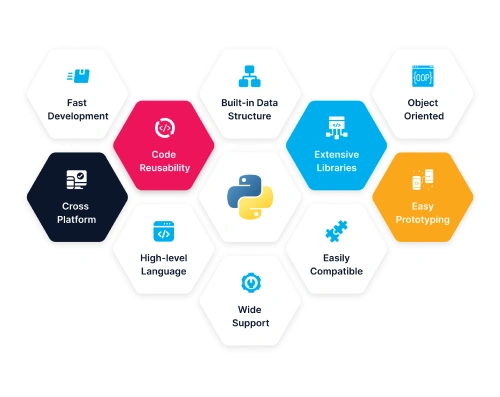Comprehensive Python Development Services
Python is a powerhouse in modern software development, revered for its simplicity, versatility, and scalability. At Dhina Technologies, we specialize in delivering cutting-edge Python solutions tailored to meet diverse business needs. From robust web applications to sophisticated AI models, our Python development services are designed to empower businesses with high-performance, future-ready solutions.
- Web development using popular frameworks like Django, Flask, and Pyramid.
- Data science and machine learning using libraries like NumPy, Pandas, and Scikit-Learn.
- Automation and scripting using Python’s extensive library support.
- API development and integration using Python’s robust API frameworks.
- Data analytics and visualization using popular libraries like Matplotlib and Seaborn.
Technical Expertise
Our Python developers possess expertise in:
- Python 3.x and 2.x versions
- Django, Flask, and Pyramid frameworks
- NumPy, Pandas, and Scikit-Learn libraries
- Matplotlib and Seaborn data visualization libraries
- API development using RESTful APIs and GraphQL
- Database integration using MySQL, PostgreSQL, and MongoDB
Advantages of Our Python Development Services
- Fast development and deployment using Python’s extensive libraries
- Scalable and secure Python applications
- High-performance Python solutions with optimized code
- Cost-effective Python development services
- Expertise in latest Python technologies and trends

Key Benefits of Python Development
Versatility Across Domains
Python supports a variety of applications, from desktop GUIs to 3D CAD tools like Blender. Its adaptability ensures efficient handling of use cases across industries.
Rapid Prototyping
With Python’s simplified syntax and extensive library support, businesses achieve up to 30% faster MVP (Minimum Viable Product) launches.
Scalability
Python’s microservices architecture supports horizontal scaling, handling increased traffic and user demands efficiently.
Comparative Analysis of Popular Frameworks
| Framework | Use Case | Key Features | Popular Apps |
|---|---|---|---|
| Django | Enterprise Applications | Robust security, ORM | Instagram, Pinterest |
| Flask | Lightweight Web Apps | Minimalist, flexible | LinkedIn, Red Hat |
| Pyramid | Flexible Scaling | URL dispatching, lightweight | Mozilla, Yelp |
Our Expertise in Python Development
Dhina Technologies stands out as the best Python development company due to our:
- End-to-end competency in Python development
- Quick turnaround time for Python projects
- Expertise in latest Python technologies and trends
- Experience in delivering successful Python projects
Python is a versatile programming language that can be used to develop a wide range of applications, including:
Web Applications
Python can be used to develop web applications using popular frameworks like Django, Flask, Pyramid, etc. It supports HTML, XML, JSON, and other internet protocols, making it a popular choice for web development.
Desktop GUI Applications
Python can be used to develop desktop graphical user interface (GUI) applications using libraries like Tkinter, PyQt, wxPython, etc. It provides a comprehensive syntax and modular programming approach to create a fast and responsive GUI.
Console-based Applications
Python can be used to develop console-based applications that interact with users through a command-line interface. These applications are typically used for tasks like data processing, system administration, or automation scripts.
Software Development
Python is useful for software development, as it can be used for build control, management, testing, etc. It works as a support language and can be used to develop software applications.
Scientific and Numeric Applications
Python is widely used in scientific and numeric computing, as it provides libraries like SciPy, NumPy, and Pandas for mathematics, science, and engineering applications.
Machine Learning and Artificial Intelligence
Python is a popular choice for machine learning and artificial intelligence, as it provides libraries like Scikit-Learn, TensorFlow, and Keras for building and training machine learning models.
Business Applications
Python can be used to develop business applications like ERP and e-commerce systems. It provides a set of specific features and targets a tight-knit user group, usually an organization.
Audio and Video Applications
Python can be used to develop applications that manipulate audio or video data, such as media players, editors, or streaming services. Libraries like PyDub and MoviePy provide tools for processing audio and video files.
3D CAD Applications
Python can be used in 3D computer-aided design (CAD) applications for tasks like modeling, rendering, and simulation. Libraries like Blender provide a comprehensive set of tools for creating and manipulating 3D models programmatically.
Image Processing Applications
Python is commonly used for image processing tasks like image enhancement, segmentation, and object detection. Libraries like OpenCV and Pillow provide tools for manipulating and analyzing images.
What Makes Us the Best Python Development Company?
- Advanced hardware systems and high-speed internet for our developers
- Standard tools and project management software for ultimate productivity
- Highly-skilled Python developers with relevant qualifications
- Prioritization of intellectual property security with NDA agreements
Contact Us
Are you looking to leverage the expertise of a top Python development company? Contact Dhina Technologies today to learn more about our services and how we can help you achieve your software goals with our top-quality Python development solutions.
FAQs
Explore Your Ideas With Us
Transform your business with our Python Development services. Achieve growth, innovation, and success. Collaborate with our skilled development team today to revolutionize your digital presence!


 Google
Google
 Trustpilot
Trustpilot
 Facebook
Facebook
 Justdial
Justdial